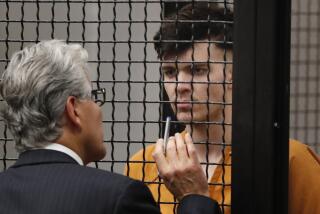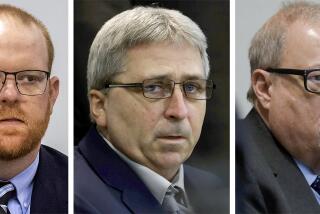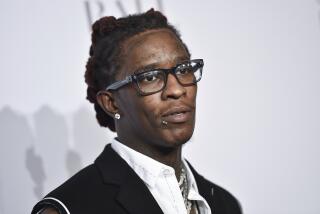Trial to begin in Trayvon Martin case
SANFORD, Fla. — When pastors, parishioners and the parents of slain teenager Trayvon Martin gathered in church recently to remember him, the mood differed from one that had prevailed at such vigils 15 months ago, when anger and sadness drove speakers to rail against a justice system that had let a killer walk free.
This time, a choir belted out an upbeat, fast-tempo version of “We Shall Overcome.” Hundreds of people in the pews stood and pounded their hands together in hearty applause, as if greeting two rock stars, when Martin’s parents, Sybrina Fulton and Tracy Martin, walked up the long aisle to the altar.
Speakers delivered messages brimming with certainty that George Zimmerman, who is to go on trial Monday for shooting Martin, will be convicted. One clergyman, offering prayers for the Martin family, the judge and the jury even added, “We pray for the defense,” signaling confidence in a case that is as divisive today as it was Feb. 26, 2012, when Zimmerman shot Martin as the unarmed 17-year-old returned in the rain from buying candy and an iced tea at a 7-Eleven.
PHOTOS: The controversial case in pictures
Zimmerman, 29, said he fired in self-defense after Martin attacked him in the gated community where Zimmerman lived and where Martin was visiting his father and his father’s girlfriend. Police initially accepted Zimmerman’s explanation, sparking allegations from Martin’s parents and civil rights activists that officers were quick to excuse the shooter because Martin was black and Zimmerman is not.
The state appointed a special prosecutor to take over the case, and on April 11, 2012, Zimmerman, an aspiring law enforcement officer and zealous neighborhood watch volunteer, was charged with second-degree murder. Zimmerman, who has been free on bail for the last year, could face 25 years to life in prison if convicted.
The trial is sure to have volatile moments. Zimmerman’s defense attorney, Mark O’Mara, hopes to knock Martin off the victim pedestal by portraying him as a troublemaker and aspiring street tough who had been sent to Sanford by his mother after getting suspended from school in suburban Miami.
FULL COVERAGE: The Trayvon Martin case
Blood tests showed that Martin had traces of the active ingredient in marijuana in his system when he died. “It is established that marijuana can affect one’s judgment and demeanor … and is known to cause paranoia and aggression in some,” O’Mara said last month as he argued that this and other details of Martin’s life — including his occasional wearing of gold-colored tooth caps and involvement in past fights — could bolster Zimmerman’s allegation that Martin was the aggressor.
Circuit Judge Debra S. Nelson ruled that O’Mara cannot mention the evidence in his opening statements, but some could find its way into court later if it is deemed relevant.
Martin’s parents and their attorneys dismiss the defense tactic as a last-ditch effort to deflect attention from the fact that Zimmerman, armed with a loaded gun, followed Martin even after a police dispatcher advised Zimmerman to stop his pursuit, telling him, “We don’t need you to do that.”
“George Zimmerman is every parent’s worst nightmare,” Benjamin Crump, the attorney for Martin’s family, said at the church service held nine days before jury selection was to begin in the Seminole County Courthouse. “What we know is he [racially] profiled Trayvon Martin.”
Crump said the case is about more than murder. No matter whether Zimmerman is convicted or acquitted, he said, the trial will send a message.
“If the killer is exonerated, there’s going to be a precedent that there are certain people you can kill in America and not be held responsible. Or there’s going to be a precedent set to show … that equal justice applies to everybody,” Crump said, adding that he’s confident the evidence — not the emotion surrounding the case — will lead to the latter.
Such predictions confound those who say that even if Zimmerman were not claiming self-defense, he would have been within his rights to open fire under Florida’s “stand your ground” law, which permits people to use deadly force if they fear death or great bodily harm.
“Zimmerman was getting the crap beaten out of him, and he defended himself,” said Randy Jones, a Sanford city commissioner, who is white. Jones said activists have created a civil rights issue where none exists.
“I imagine this will all come out in trial,” Jones said, “but that’s just it: Why are we even going to trial?”
Nancy McCarthy, a white Sanford resident, agreed. “I think it’s become too much of a civil rights issue. If it weren’t a matter of color, I doubt there would even be a trial,” she said.
In the Goldsboro neighborhood, which was an independent black city until its incorporation into Sanford in 1911, some residents who took part in the 2012 protests say the case already has led to a victory of sorts because of the issues it laid bare and the activism it spurred.
“It showed people who thought Sanford had dropped the ball that Sanford had dropped the ball,” said Kenneth Bentley, a member of the National Assn. for the Advancement of Colored People, who sits on a 22-member panel formed after Martin’s killing to examine police tactics and recommend changes. Among the things Bentley says are needed: more black police officers to gain trust in the black community, which remains leery of a force plagued by racially charged incidents.
The current police chief, Cecil E. Smith, is black and took over after his white predecessor, Bill Lee, was fired over the Martin case. Lee had been on the job just 10 months; he succeeded a white chief who was forced to resign after a police officer’s son beat a black man in downtown Sanford. Police did not arrest the assailant, even though the beating was captured on video.
Francis Oliver, the curator of the Goldsboro Historical Museum, which documents the community’s 20 years as a self-governing town, said such changes show the chipping away of a system that in the past might have swept Martin’s death aside.
“Justice has already been served,” Oliver said. “Zimmerman was arrested.”
More to Read
Start your day right
Sign up for Essential California for news, features and recommendations from the L.A. Times and beyond in your inbox six days a week.
You may occasionally receive promotional content from the Los Angeles Times.







